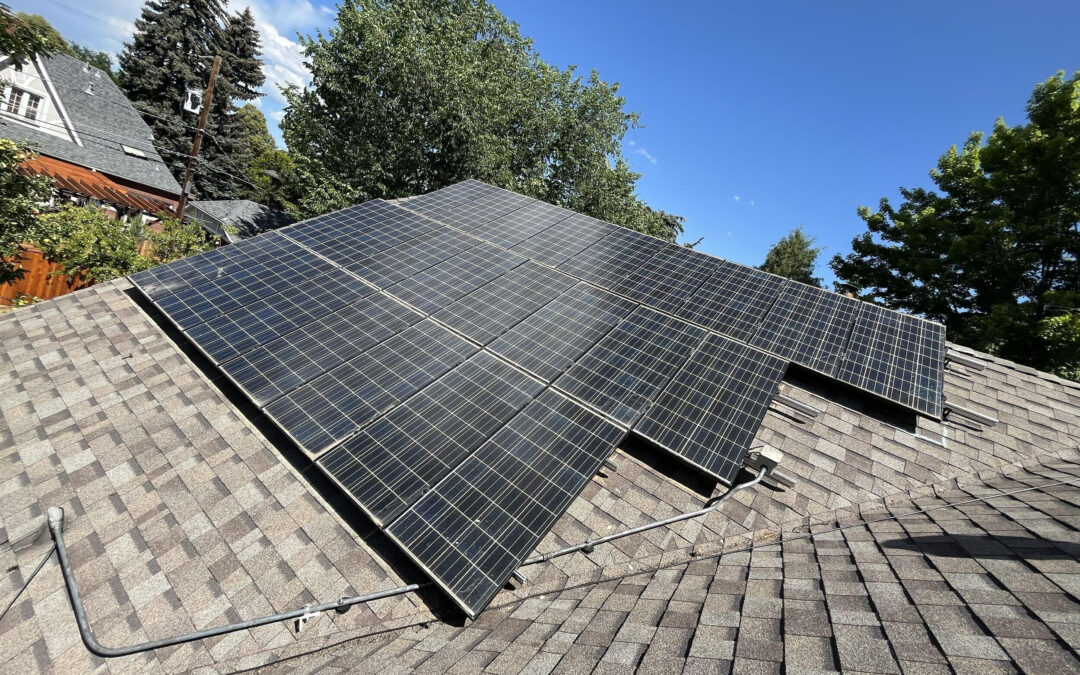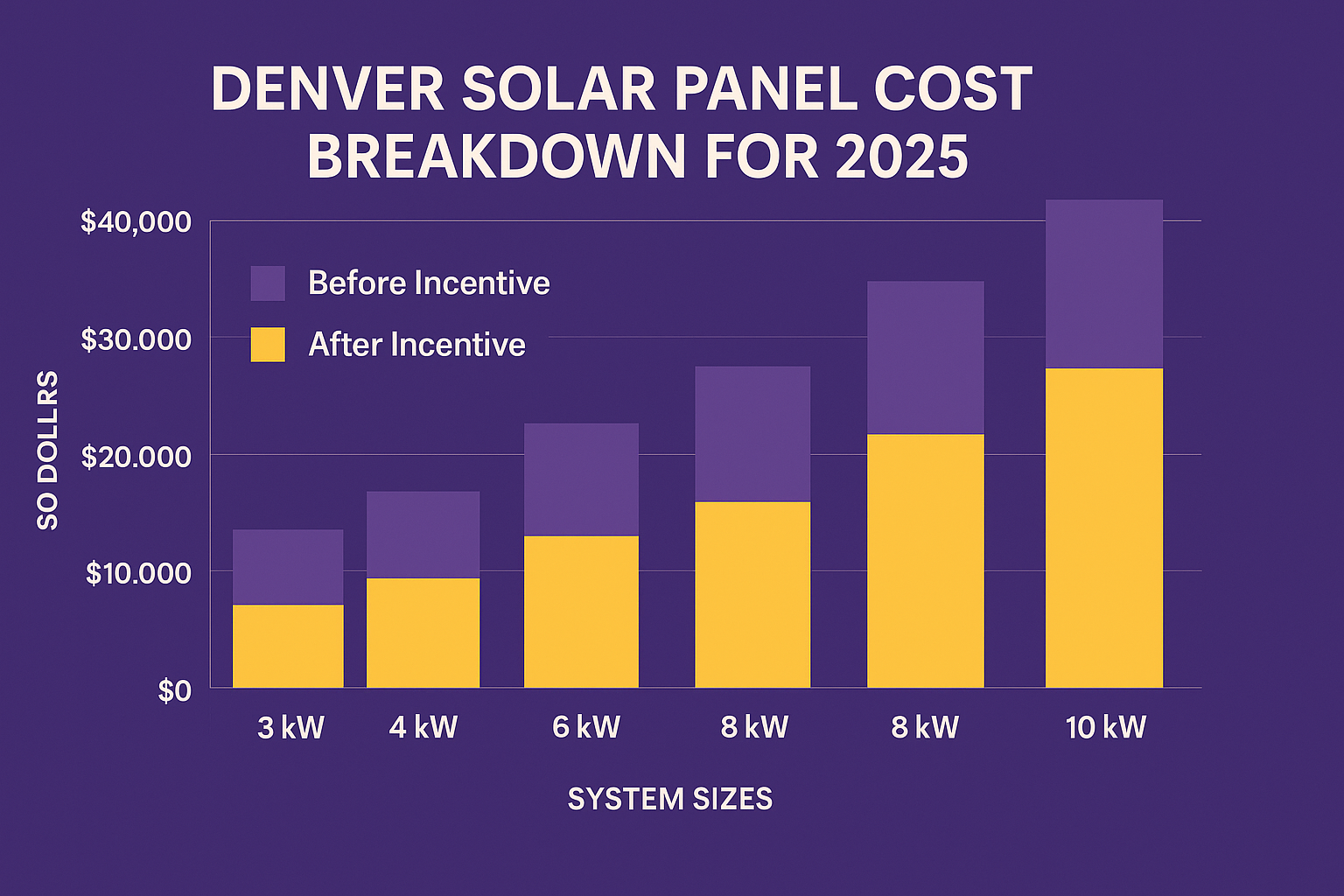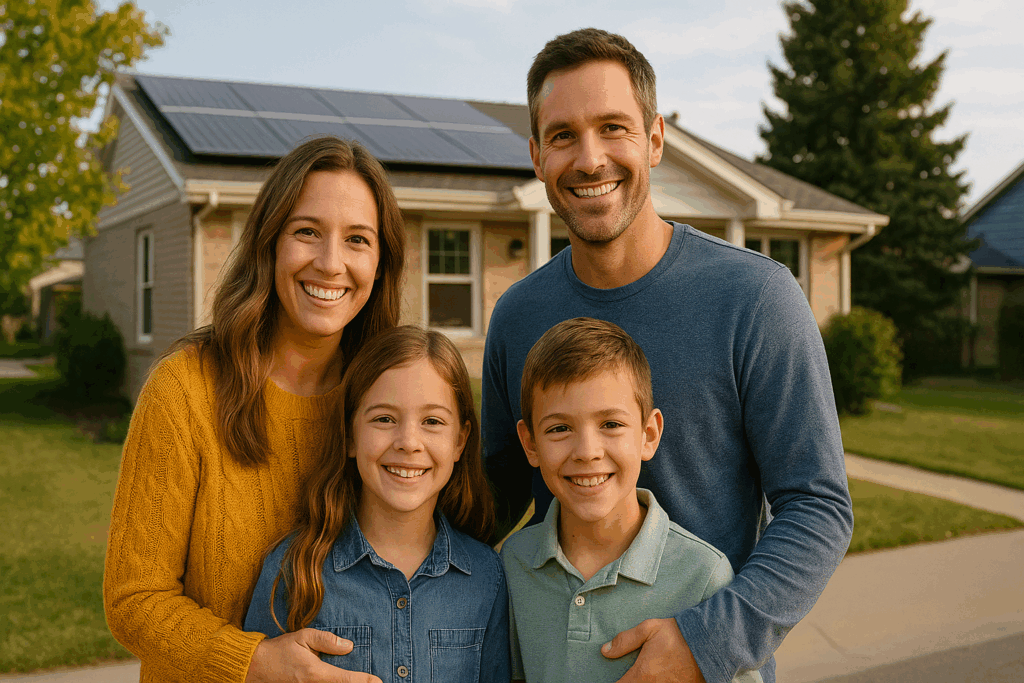The friendly, local homeowner’s guide from BriteStreet Solar (13+ years in Colorado)
Denver Solar Panel Costs 2025—At a Glance:
Denver homeowners are paying about $2.84 per watt for solar panel installations in 2025. That means a typical 5 kW system costs $14,200 before incentives—and just $9,950 after the 30% federal tax credit. With over 300 sunny days each year, Denver is among the best U.S. cities for solar savings, with most families seeing a $50,000–$60,000 return over 25 years. This guide breaks down everything you need to know: costs, incentives, real Colorado case studies, and how BriteStreet Solar helps you save more from day one.
What Is the Real Cost of Solar Panels in Denver (2025)?
If you’re wondering what you’ll actually pay for solar in Denver this year, you’re not alone. With electricity rates rising and Colorado leading the nation in sunshine, it’s no surprise more homeowners are considering solar in 2025. Let’s break down real, local prices so you can budget with confidence.
Denver Solar Panel Cost Table – July 2025
| System Size | Before Incentives | After 30% Federal Tax Credit | Typical Monthly Savings |
|---|---|---|---|
| 3 kW | $8,520 | $5,964 | $45–$65 |
| 5 kW | $14,200 | $9,940 | $75–$105 |
| 7 kW | $19,880 | $13,916 | $110–$145 |
| 10 kW | $28,400 | $19,880 | $150–$210 |
Key 2025 Cost Facts:
-
Average cost per watt: $2.84 (includes all equipment and installation)
-
Typical payback period: 10–14 years, depending on system size and home energy use
-
Total 25-year savings: $50,000–$60,000 for most families
-
Home value boost: Solar can increase your property value by $15,000–$20,000 on resale
Local Insight:
Unlike national averages, these numbers reflect real BriteStreet Solar projects across Denver, Aurora, Lakewood, Boulder, and Fort Collins. Our transparent pricing means you’ll always know exactly what to expect before you sign any contract.
What Affects the Cost of Solar Panels in Denver?
Solar panel pricing isn’t one-size-fits-all. Several important factors influence what you’ll pay for your installation. Understanding these helps you budget accurately and avoid surprises.
1. System Size
The biggest driver of cost is how many panels you need. Larger homes—or those with higher energy usage—will require more panels and a bigger inverter, increasing the price but also the savings.
2. Roof Type and Complexity
Simple, single-story, south-facing roofs are the easiest (and cheapest) for solar installation. Steep pitches, multiple roof faces, or multi-story homes can add labor costs. We provide a custom design for each home to maximize sun exposure, regardless of roof style.
3. Panel Brand and Quality
We use premium Q-Cell solar panels, known for efficiency and excellent 25-year warranties. Some homeowners opt for even higher-efficiency brands or U.S.-made panels, which can add to the price.
4. Electrical Upgrades
Older homes may need electrical panel upgrades to safely accommodate solar. We’ll assess your home’s wiring and panel capacity during our free assessment—upgrades are quoted up front, so you’re never surprised by hidden costs.
5. Permitting and City Fees
Permitting requirements vary by city. Denver, Boulder, Aurora, and Fort Collins each have unique processes and costs. We handle all paperwork, HOA forms, and utility interconnection for you—so you can relax!
6. Installation Difficulty
Ground-mounted solar systems (popular in some larger Denver lots) cost slightly more due to extra labor and mounting hardware. Multi-story homes also take a bit longer to install, which can affect the final price.
7. Optional Features
Adding battery backup for outage protection, premium monitoring systems, or critter guards will increase the overall cost—but can add significant value and peace of mind.
Pro Tip:
During your free BriteStreet Solar assessment, we’ll break down every cost factor and show you exactly where you can save.
How Do Incentives Lower My Solar Cost in Colorado?
Solar incentives are the secret weapon for Colorado homeowners—helping you cut thousands off your upfront costs and shrink your payback period. Here’s how to maximize every available savings in 2025.
Federal Solar Tax Credit (ITC) – 30% Off the Top
The biggest incentive is the federal Residential Clean Energy Credit. For any system installed in 2025, you can claim 30% of your total solar installation cost as a tax credit on your federal return. That’s not a deduction—it’s dollar-for-dollar money back.
Example:
For a $14,200 system, you’ll save $4,260 come tax time, making your net cost just $9,940.
Colorado Solar for All Program
If your household income qualifies, you can receive rebates up to $1 per watt (that’s $5,000+ on a 5kW system) through the state’s Solar for All initiative. This can make solar affordable for nearly every homeowner, especially when combined with other incentives.
Xcel Energy Net Metering
With Xcel’s net metering program, your excess solar power is sent to the grid—and you get credited at the full retail rate. Many Denver customers see electric bills drop to under $30/month year-round, and some even “bank” credits for the winter.
Stacking Local Incentives
Some cities and utilities offer bonus rebates or expedited permitting. BriteStreet keeps track of every local program, so you never leave money on the table.
How Much Can You Save?
Most BriteStreet Solar customers see their net solar investment shrink by 35–40% when combining the federal credit with state and utility programs. On top of that, your long-term electric bill savings start the very first month.
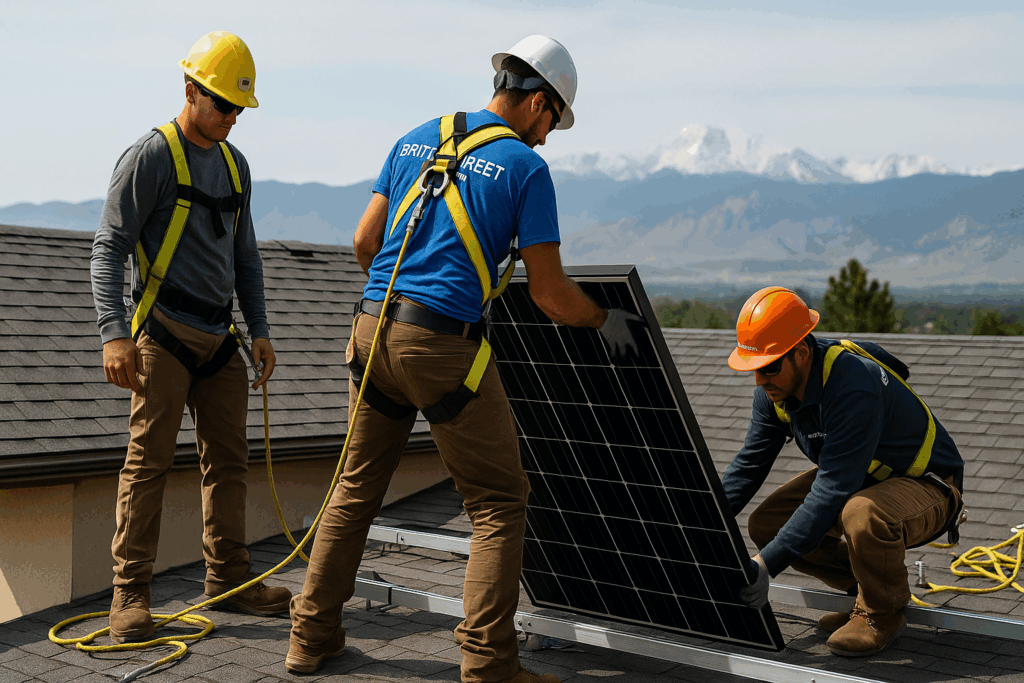
Real Colorado Customer Success Stories
Nothing tells the story of solar in Colorado better than real homeowners who’ve already made the switch. Here are a few case studies from across the Denver metro area—each with different needs, home styles, and energy goals.
Maria L., Cherry Creek, Denver
“BriteStreet walked us through every step. Our 6.2 kW system knocked our bill down from $210 to under $30—even in winter! We feel good knowing our kids are growing up in a solar-powered home.”
— Maria L.
-
System: 6.2 kW (18 Q-Cell panels)
-
Total investment after incentives: $12,326
-
Monthly savings: $145–$180
-
Payback period: 8.2 years
-
25-year savings: $61,200
Carlos M., Highlands Ranch
“We installed an 8.6 kW system in March 2024 for $24,768 after tax credits. Our monthly electric bill went from $340 to just $28! In our first year, we saved over $3,600.”
— Carlos M.
-
System size: 8.6 kW (22 Q-Cell panels)
-
Total investment: $24,768 (after incentives)
-
Monthly savings: $312 average
-
Payback period: 6.6 years
Sandra R., Boulder
“BriteStreet made the solar process stress-free. They handled permits, install, and even HOA approvals. Even after a snowstorm, our panels were generating more than expected.”
— Sandra R.
-
System: 5 kW, roof mount
-
Investment after incentives: $10,486
-
Monthly bill before solar: $180
-
Monthly bill after solar: $19
-
25-year gain: $54,200
James T., Westminster
“My 6.2 kW system has produced 15% more power than projected. Best investment I’ve made for my home.”
— James T.
-
System size: 6.2 kW (16 Q-Cell panels)
-
Investment: $17,640 (after incentives)
-
Monthly savings: $185 average
-
System performance: 115% of projection
“We saved over $6,000 on our install between the federal tax credit and local rebates. Our first summer bill was $23!”
— Pat, Lakewood
Why Colorado Is Perfect for Solar Energy
Colorado isn’t just a beautiful place to live—it’s also one of the best places in America to go solar. Whether you’re in Denver, Boulder, Fort Collins, or any Front Range city, here’s why solar panels deliver unbeatable value in our state.
300+ Days of Sunshine Every Year
With over 300 sunny days annually, Colorado rivals many southern states for solar potential. More sunshine means more power from every panel, every month—regardless of winter snow.
High Altitude, Bigger Benefits
Denver’s mile-high altitude means thinner air, which actually boosts solar panel efficiency. Sunlight is more intense here, so panels generate more electricity per square foot compared to lower elevations.
Cool Temperatures = Efficient Panels
Solar panels work best in cooler temperatures. Colorado’s moderate climate means your panels keep working at peak output, even during long summer days. Cold, sunny winter days can be some of your most productive.
Snow Is No Problem
Worried about snow? Good news: snow naturally cleans panels as it slides off, and its reflective surface actually increases sunlight exposure. Plus, most snow melts quickly off dark solar panels, so downtime is minimal.
Rising Electricity Rates
Colorado’s main utility, Xcel Energy, has raised rates by over 15% since 2021. Solar locks in your energy price, protecting your family from unpredictable increases and putting you in control of your utility bills.
State and Local Incentives
Colorado consistently ranks in the top 15 states for solar capacity thanks to generous incentives, rebates, and net metering programs that help you save more—faster.Bottom Line:
Colorado’s unbeatable combo of sunshine, high altitude, smart incentives, and rising electricity rates makes going solar a smart, reliable investment for any homeowner.
BriteStreet Solar Installation Process
Choosing solar is a big decision, but the process doesn’t have to be stressful. At BriteStreet Solar, we guide you through every step—from first call to final activation—with clarity and care. Here’s how a typical residential installation works:
1. Free Home Assessment
-
A certified BriteStreet technician visits your home to evaluate your roof, shading, and current electric use.
-
We review your past 12 months of energy bills and answer every question you have about the process, technology, and savings.
-
You’ll get a custom solar design and savings estimate, with transparent, no-pressure pricing.
2. Custom System Design
-
Our team creates a detailed proposal, showing exactly where your panels will be installed, your estimated system output, and how much you’ll save every year.
-
We use the latest modeling software to ensure your system is sized for your home and future energy needs.
3. Permitting & HOA Approvals
-
We handle all the paperwork—including city permits, HOA approvals, and utility applications—so you don’t have to worry about red tape or delays.
-
Our local experience means we can anticipate and resolve common permitting issues fast.
4. Professional Installation
-
Our NABCEP-certified installers arrive on schedule and treat your home like their own.
-
Most residential projects are completed in just 1–2 days, minimizing disruption to your routine.
-
We use premium mounting hardware, ensure all wiring is safe and code-compliant, and keep your property clean.
5. Final Inspection & System Activation
-
After installation, we coordinate final inspections with your local building department and utility.
-
Once everything is approved, we “flip the switch”—and your panels begin producing clean, free electricity from day one.
6. Ongoing Monitoring & Support
-
Every BriteStreet Solar system includes monitoring so you can track your system’s performance from your phone or computer.
-
Our team is always available for questions, annual maintenance, and long-term support—helping you get the most from your investment, year after year.
Pro Tip:
Ask about our maintenance plans to keep your solar system operating at peak efficiency, including annual cleanings and system checks.
Solar Panel Cost vs. Long-Term Savings
While solar is an investment, the long-term returns are among the best you’ll find for any home upgrade. Here’s why going solar with BriteStreet isn’t just about “being green”—it’s about serious, lasting savings.
Initial Investment Example
Let’s look at a typical 7 kW system for a Denver-area home in 2025:
-
System cost before incentives: $19,880
-
Federal tax credit (30%): –$5,964
-
Net investment: $13,916
25-Year Financial Projection
-
Total electricity savings: ~$52,000 (based on average Xcel Energy rates and projected rate hikes)
-
Home value increase: ~$15,000 (according to local real estate data)
-
Total return: ~$67,000
-
Net profit over 25 years: $53,084
Annual and Monthly Impact
-
Year 1 savings: Most customers save $1,000–$1,400 in the first year alone.
-
Monthly bill after solar: As low as $20–$40 for most Denver homes.
-
Break-even point: 10–14 years for most systems; sooner if you take advantage of extra local incentives.
What About After Payback?
Once your solar system has “paid for itself,” all additional savings are pure profit. Most homeowners enjoy 10–15 years of free, renewable electricity—plus protection against future utility rate spikes.
Bonus: Environmental Impact
-
A 7 kW system offsets over 175 tons of CO₂ over 25 years—the equivalent of planting 4,000+ trees or removing two cars from the road!Pro Tip:
Solar isn’t just for the math geeks! With BriteStreet’s full-service approach, you’ll always know your return on investment and the impact you’re making on your wallet—and the planet.
Solar Panel Financing Options in Colorado
Worried about the upfront cost of solar? You’re not alone. The good news: most Colorado homeowners finance their solar system, making clean energy affordable right from the start. Here’s how you can go solar with zero hassle and low monthly payments.
1. Solar Loans
Most BriteStreet customers choose a solar loan. These loans are designed specifically for home energy improvements:
-
Low interest rates: As of 2025, rates typically range from 2.99% to 7.99% depending on credit score and loan term.
-
Flexible terms: Choose 10, 15, 20, or even 25-year repayment options.
-
No upfront cost: Often $0 down—start saving on electricity from day one.
-
Own your system: All rebates and tax credits go directly to you, and you keep the long-term savings.
Example:
A typical 5 kW system, financed over 15 years, can have monthly payments lower than your old electric bill—with payments as low as $85–$120/month for many families.
2. Colorado RENU Loan
The state’s Colorado Residential Energy Upgrade (RENU) Loan is another popular option:
-
Backed by the Colorado Clean Energy Fund
-
Competitive interest rates and no penalty for early payoff
-
Covers solar, battery storage, and energy efficiency upgrades
-
Borrow up to $75,000 for qualified home projects
3. Other Financing Options
-
Home equity loans/lines of credit: Use existing equity for even lower rates and potential tax benefits.
-
PACE (Property Assessed Clean Energy): Available in select Colorado cities, lets you pay over time through your property tax bill.
4. Cash Purchase
Paying cash up front? You’ll get the highest lifetime savings, fastest payback, and avoid any interest charges. But remember—most homeowners still choose to finance so they can keep their cash for other needs.
Pro Tip:
Our team will walk you through every financing option during your free solar assessment, helping you compare payments, savings, and incentives. No pressure—just clear numbers and honest advice.
How Does Solar Increase Your Home’s Value?
Studies show most homes gain $15,000–$20,000 in value after going solar. If you own (not lease) your system, it transfers to new buyers easily—making your home more attractive and affordable.
Front Range Solar Cost Variations
While Denver is often the benchmark for Colorado solar pricing, the Front Range includes several cities and suburbs—each with unique labor, permitting, and utility factors that can affect your final solar investment. Here’s what you need to know if you live in or near the Denver metro area.
Denver Metro
-
Average installed cost: $2.84 per watt
-
Why: Denver has higher labor rates than some suburbs, but streamlined city permitting and strong installer competition help keep prices steady.
-
Typical 5 kW system: $14,200 before incentives
Aurora
-
Slightly below Denver’s average: Around $2.75–$2.80 per watt
-
Why: Newer housing stock and straightforward permitting can lower install times and costs.
Lakewood, Arvada, Littleton
-
Similar to Denver: $2.80–$2.88 per watt
-
Notes: These suburbs have a mix of roof styles, and HOA requirements can occasionally add to timelines (but not costs).
Boulder County
-
Slightly higher: $2.95 per watt or more
-
Why: Boulder requires premium panel brands, has green building codes, and mandates advanced permitting, making it the most premium-priced area along the Front Range.
-
Typical 5 kW system: $14,750 before incentives
Fort Collins
-
Lower than average: About $2.72 per watt
-
Why: Lower overhead for installers, efficient city processes, and strong utility incentives keep prices competitive.
-
Bonus: Some homeowners may qualify for extra rebates through the municipal utility.
What It Means for You:
No matter where you live along the Front Range, your investment will be tailored to your city’s codes and utility programs. BriteStreet Solar’s local expertise means we optimize your install for both savings and speed, with transparent pricing from the start.
Commercial Solar Costs in Colorado
Solar isn’t just for homeowners—businesses across Denver and the Front Range are saving big with commercial solar installations. If you own or manage a commercial property, here’s what you need to know about going solar in Colorado.
Lower Cost Per Watt, Bigger Systems
-
Typical commercial solar cost: $1.50–$2.50 per watt (lower than residential, thanks to scale)
-
System sizes: 25 kW to 500 kW+ are common for office buildings, warehouses, and retail centers
-
Custom design: Every system is tailored for your site’s energy use, roof space, and operational needs
Commercial Incentives & Tax Benefits
-
Federal Investment Tax Credit (ITC): Businesses also get 30% off the total installed cost, just like homeowners
-
Accelerated Depreciation (MACRS): Claim bonus depreciation, allowing you to write off most of your solar investment in the first year—creating immediate cash-flow benefits
-
Utility rebates: Some Colorado utilities offer special incentives for commercial solar, depending on your location and system size
Fast Payback, Long-Term Value
-
Payback period: 4–7 years for most Colorado businesses
-
Annual electricity savings: 15–30% reduction in operating costs is typical
-
Energy resilience: Add battery storage for backup power and peak demand reduction
-
Sustainability: Solar helps businesses meet green goals, win new customers, and stand out in their community
BriteStreet’s Commercial Experience
BriteStreet Solar has helped local businesses of all sizes—including retail shops, medical practices, apartment complexes, and manufacturing plants—cut their energy bills and future-proof their operations. Our commercial solar team handles everything: analysis, system design, financing guidance, installation, and long-term support.
Pro Tip:
Ask about our commercial case studies to see how solar transformed costs and sustainability for businesses just like yours.
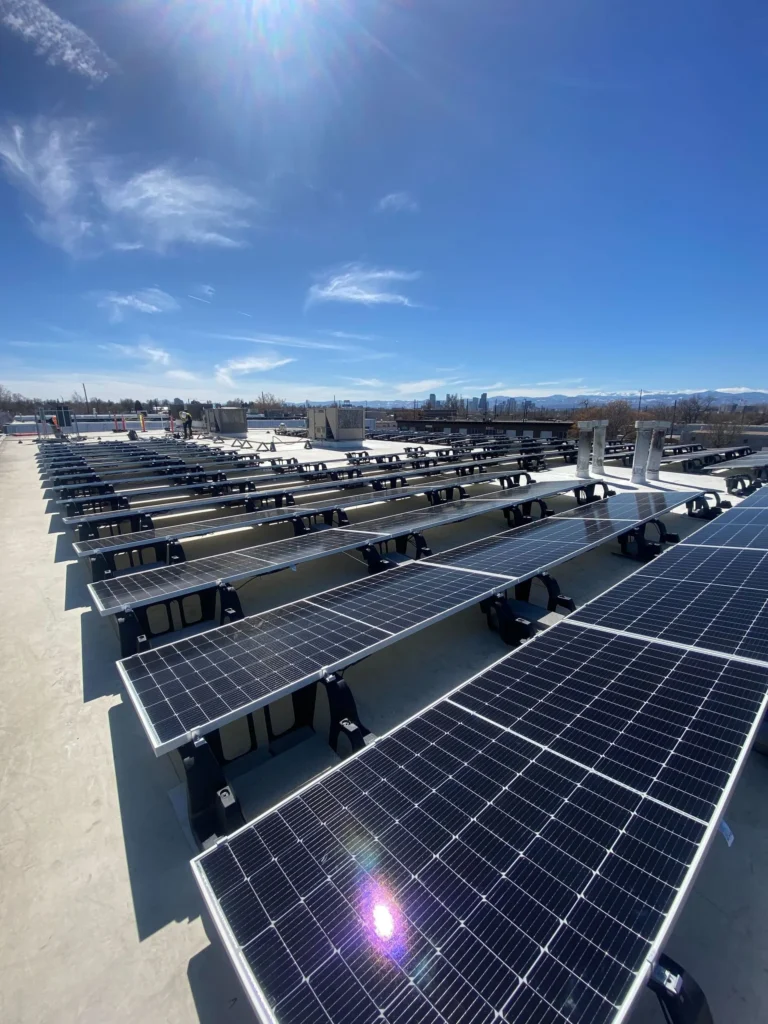
Frequently Asked Questions About Solar Panels in Denver
How much do solar panels cost for a 2,000 square foot house in Denver?
A typical 2,000 sq. ft. Denver home will need a 6–8 kW solar system, which costs between $17,000 and $22,700 before incentives. After the 30% federal tax credit, that’s about $11,900 to $15,900. Final price depends on your roof’s size, orientation, shade, and your electricity use.
Pro Tip: A free solar assessment from BriteStreet gives you a custom quote based on your actual needs.
Do solar panels work in Colorado’s winter and with snow?
Absolutely! Solar panels are even more efficient in cold weather than heat. Denver’s 300+ sunny days mean you get power all year—even in winter. Snow usually slides off panels quickly and actually cleans them, while the sunlight reflected off snow can increase energy production on bright winter days.
What’s the typical payback period for solar panels in Denver?
Most homeowners see payback in 10–14 years, with some reaching it in as little as 7–9 years if they maximize incentives and have high electric bills. After payback, you enjoy “free” electricity for 10+ years and a boost in home value.
How long do solar panels last in Colorado?
Modern solar panels are rated for 25 years or more. Premium panels (like the Q-Cells BriteStreet installs) include a 25-year product and performance warranty—guaranteeing at least 84% of their original power after 25 years. Many systems keep producing for 30+ years with minimal maintenance.
Can I install solar panels myself to save money?
DIY solar is technically possible, but it’s not recommended for most homeowners.
Why?
-
Complex permitting and utility paperwork
-
Electrical safety and code requirements
-
Warranty coverage (many manufacturers require professional install)
-
Missed rebates (most incentives require proof of licensed install)
A pro installation ensures safety, full incentives, long-term performance, and peace of mind.
What if I sell my house after installing solar?
Owned solar panels (not leased) usually increase Colorado home values by $15,000–$20,000. When you sell, the system transfers to the new owner, and most buyers see solar as a major upgrade that reduces monthly expenses and environmental impact.
Do I need a battery backup system in Colorado?
Battery backup is optional for most Denver homeowners, thanks to reliable grid power and Xcel’s net metering. But batteries provide:
-
Peace of mind during outages
-
Extra savings with time-of-use electricity rates
-
The ability to store solar power for night or emergency use
-
Ask us about current battery incentives and options if you’re interested!
How much maintenance do solar panels require in Denver?
Minimal!
-
Rain and snow naturally clean most panels
-
Annual inspection is recommended to check for debris, loose wiring, or inverter updates
-
BriteStreet’s maintenance plans include cleaning and system check-ups every 2–3 years for maximum efficiency
What size solar system do I need?
System size depends on your family’s energy use, roof space, and budget. Most Denver homes do well with 5–10 kW systems.
We’ll analyze your last 12 months of energy bills and design the optimal system during your free assessment.
Are there hidden costs beyond the solar panel installation?
BriteStreet provides all-inclusive pricing—covering panels, inverters, mounts, permitting, and installation. The only possible extras:
-
Electrical upgrades (if your panel is old)
-
Roof repairs (if needed)
-
Premium monitoring or battery systems (optional)
All costs are discussed up front—no surprises, no hidden fees.
How do I get started?
The easiest way is to book a free home solar assessment. We’ll analyze your roof, review your bills, answer your questions, and design a system tailored just for you—with all incentives and financing options explained.
Contact BriteStreet Solar or call (844) 442-7483 to get started!
Ready to Go Solar? Get Your Free Assessment Today!
You’ve seen how affordable and rewarding solar can be for Denver and Front Range homeowners in 2025. The next step is easy—and there’s no obligation:
Get a Free, Custom Solar Assessment with BriteStreet Solar!
Our local, certified team will:
-
Analyze your roof and electricity use
-
Design a custom solar system just for your home
-
Calculate your exact savings, incentives, and payback
-
Answer all your questions with honest, up-front pricing
Whether you want to lower your bills, boost your home’s value, or take control of your energy future, BriteStreet Solar is here for you—every step of the way.
Call today: (844) 442-7483
Email: info@BriteStreet.com
Or request your free quote online: BriteStreet.com/contact
Let us help you make 2025 the year you go solar—clean, affordable, and truly local!
Why Choose BriteStreet Solar?
-
13+ years serving Colorado families
-
Over 4,000 homes powered by us
-
All local staff, no call centers
-
5-star reviews from real Denver neighbors
-
One-stop shop—from assessment to maintenance
You deserve a partner you can trust—and a team that answers every call with a smile!

